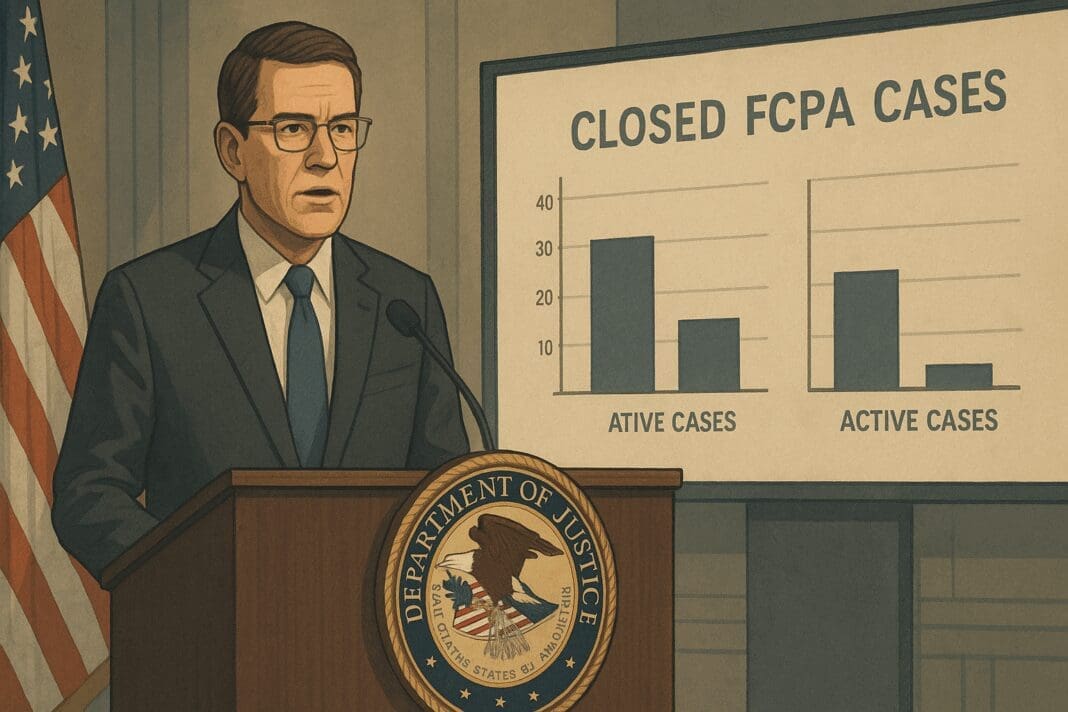The U.S. Justice Department has quietly closed about half of its open Foreign Corrupt Practices Act (FCPA) probes and released new guidelines that tie future anti-bribery prosecutions to clear U.S. national-security or competitiveness harms. The move, coupled with fresh whistle-blower incentives and a sharper focus on individual culpability, redraws the risk landscape for multinationals—especially in cyber-finance hubs.
KEY POINTS
- 50 % of active FCPA investigations terminated; only “strategic” cases remain.
- New June 9 Guidelines require prosecutors to prove material harm to U.S. interests and obtain senior sign-off before opening a file.
- Individual accountability is now paramount, reinforced by an expanded Corporate Whistle-blower Awards Pilot Program.
- Companies that self-disclose, cooperate, and remediate can avoid charges; monitorships will be used sparingly.
- Digital-asset bribery flagged as an emerging threat—DOJ’s April memo narrows its crypto focus to bad actors, not platforms.
SHORT NARRATIVE
On June 9-10, 2025, Deputy Attorney General Todd Blanche unveiled the Guidelines for Investigations and Enforcement of the FCPA, ending a 180-day enforcement pause ordered by President Trump. Roughly half of all pending corporate-bribery matters—including headline probes into aerospace and medical-device giants—were dismissed. Prosecutors must now show that alleged bribery undermines U.S. national security, distorts competition for American firms, aids cartels/TCOs, or involves serious, concealment-rich misconduct before proceeding. The policy dovetails with DOJ’s separate digital-asset directive, which targets individuals using crypto for illicit finance rather than compliant platforms.
EXTENDED ANALYSIS
| Dimension | Implications |
|---|---|
| Legal | The national-interest test effectively narrows FCPA’s extraterritorial reach; expect jurisdictional challenges from defense counsel and a likely uptick in Mutual Legal Assistance Treaty (MLAT) requests as DOJ defers “non-strategic” cases to local authorities. (Source: wilmerhale.com) |
| Regulatory | SEC civil FCPA enforcement remains untouched, creating a two-track system where companies may still face SEC exposure even when DOJ steps back. Parallel regimes (UK Bribery Act, Sapin II) will fill gaps, increasing cross-border coordination pressure. |
| Operational | Compliance teams must map bribery risks to four DOJ factors (cartels/TCOs, U.S. competitiveness, national security, gravity of misconduct). Third-party and high-risk-market onboarding processes need recalibration—in particular where payments flow through digital assets or AI-enabled supply-chain platforms. (Source: hunton.com) |
| Whistle-blowers & Individuals | The expanded pilot program promises monetary rewards for original tips leading to > $1 m forfeitures, amplifying insider threat vectors and necessitating stronger internal reporting channels. (Source: reuters.com) |
| Cyber-Finance Intersection | While the FCPA normally targets “anything of value,” the DOJ’s crypto memorandum signals that token-based inducements may fall under FCPA if used to bribe foreign officials tied to TCOs or sanctioned entities. Firms in DeFi, payment orchestration, and cross-border remittance should expect joint FCPA–money-laundering sweeps. (Source: hunton.com) |
CALL FOR INFORMATION
Have intel on bribery schemes involving crypto wallets, AI-powered procurement, or offshore payment gateways? Share your information via our whistleblower system, Whistle42.
